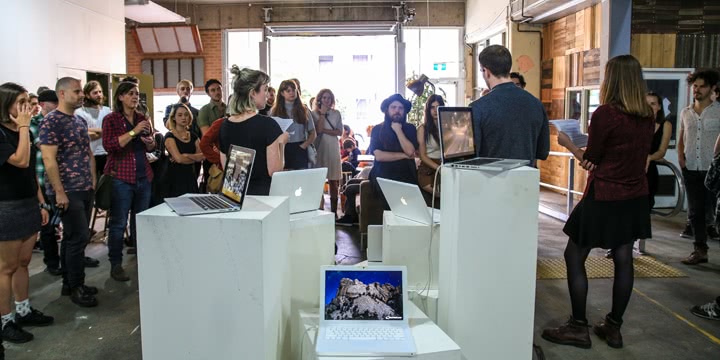Electrofringe is bringing EF16 to 107 Projects this weekend. What is the overarching aim or motto behind the event?
EF16 marks a return to communal, uncensored and non-surveilled spaces to act on free speech. We want to look at how digital networks can be applied to take back the controls of our systems. It’s vital to create new platforms, spaces and networks that continue to enable openness in the future.
Tell us about a couple of specific works that will explore experimental ideas.
An emerging theme in this year’s program is using the human form and voice to express relationships with technology and ecology. That’s explored in works such as It Speaks Of Others curated by Elyse Goldfinch, Echo by Loc Nguyen and Silent Songs by Romi Nam, as well as performances by Astrid Zeman and Skye Gellmann. Works more grounded in commentary and activism, like NEWT’s The Eye Of God and Hamish Dobinson’s Gross Domestic Product, offer creative warnings about understanding the technology that controls society, and possibilities that have the potential to generate equal control of individual empowerment.
The wearable artwork Clothing Crisis doesn’t only engage with technology, it makes use of social media. Are we in a new era of unpredictable art?
Clothing Crisis explores the repurposing of both immaterial networks and material clothing. It’s the result of a collaboration between new media artists, a fashion designer and a sound designer. The most unpredictable art going on now is happening across industries, in science laboratories and underground technology studios. We’re excited about – and highly encourage – improvisation and inspiration from these sources.
Do you think electronic experimental art might prove itself more accessible to budding creators than traditional forms?
Electronic experimental art has been progressively thriving since the ’60s. I think it has proven itself to be both accessible and exciting for artists and non-artists to realise new, daring concepts.
How will EF16’s workshop series encourage participants to get involved?
The workshops are open to everyone, and through them we hope to demystify the technical-artistic process, to provide an access point for people to get hands-on and involved with creative tech beyond experiencing it as a viewer. There’s two workshops using older technologies (Atari game programming and Renoise tracker software for music), and another on analogue electronic sculpture/robotics (no programming required).
[Pictured:Open Source by Aurora Scott and Mahira Sobral at EF2015, photo by Ash Berdebes]
EF16 takes place at 107 Projects, Saturday October 22 – Sunday October 23.


































